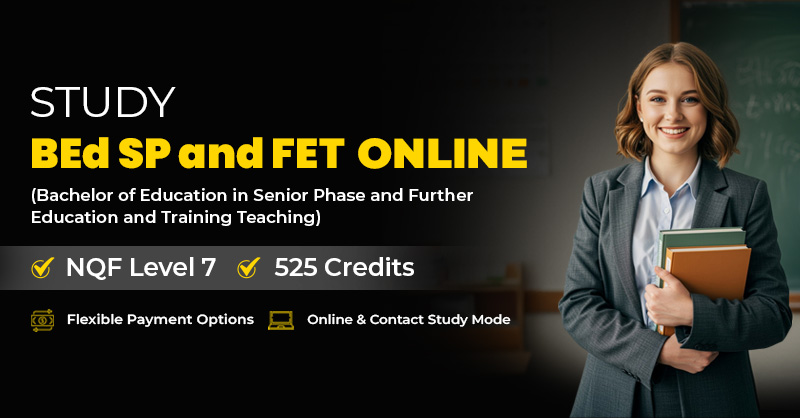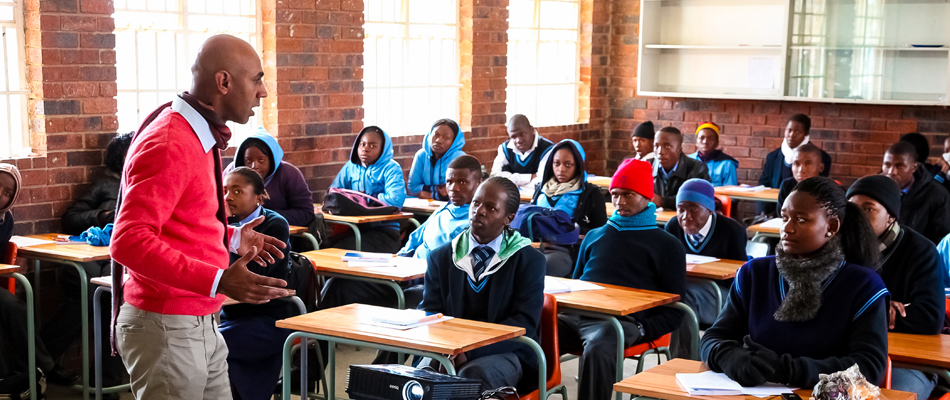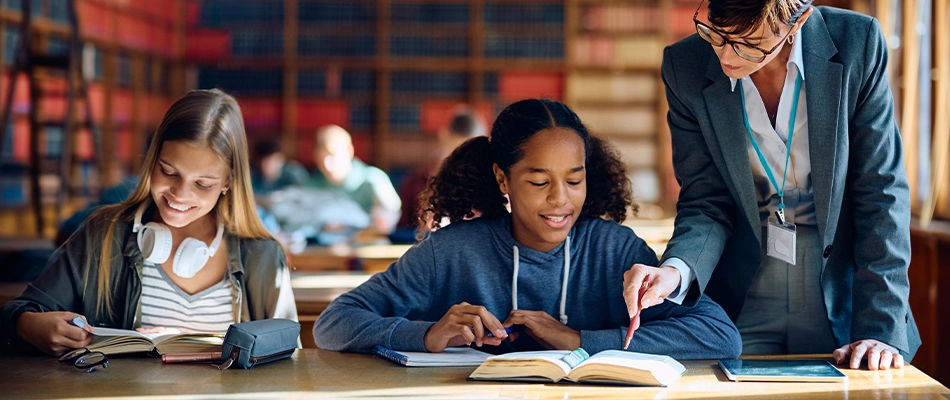Teaching students with disabilities is an important part of building an inclusive, fair, and supportive education system. In South Africa, inclusive education is a national priority, ensuring that all children, regardless of physical, emotional, or cognitive ability, have access to quality education. The demand for teachers who understand inclusive education in South Africa is growing as classrooms become more diverse and policies evolve to reflect equity-based learning. The BEd (Senior Phase and Further Education and Training Teaching) qualification at Regenesys equips aspiring educators with the skills necessary to cater to a range of learning needs.
In this article, we will cover how BEd graduates are trained in teaching learners with disabilities, the strategies they learn, and how they are beneficial.
Table of Contents
- What is Inclusive Education?
- Challenges Faced by Differently-Abled Learners
- Adapting Teaching Materials
- Emotional Intelligence in Inclusive Classrooms
- CAPS & Inclusive Teaching
- Regenesys Approach to Inclusive Education
- Working with Specialists
- Legal Frameworks (IEP, SIAS)
- Inclusive Tech Tools
- Building Empathetic Classroom Culture
- Conclusion
- Inclusive Classrooms in South Africa – FAQ
What is Inclusive Education?
Inclusive education in South Africa is an educational approach that ensures all learners, regardless of ability, background, language, or socioeconomic status, have equal opportunities to learn and participate meaningfully in mainstream classrooms. It is not limited to teaching learners with disabilities; rather, it encompasses a broader commitment to diversity, equity, and access for every child.
At its core, inclusive education involves transforming schools and teaching practices to accommodate the full range of learner needs. This means adapting the curriculum, instructional methods, assessments, and school infrastructure to create environments where all learners can thrive.
Inclusive classrooms value differences and promote a culture of acceptance and mutual respect. Teachers are trained to differentiate instruction, adjust teaching materials, and provide personalised support where necessary. Within this inclusive framework, teaching learners with disabilities becomes a critical and collaborative responsibility of the entire education system.
Regenesys BEd students develop expertise in teaching learners with disabilities through core modules and the practical Work Integrated Learning portion of the curriculum.
Read more on What is a Bachelor of Education (BEd)? Scope, Eligibility, Duration & Career Opportunities

Challenges Faced by Differently-Abled Learners
Teaching learners with disabilities effectively begins with understanding the complex challenges they encounter in traditional educational environments. These challenges are not limited to academics but also affect the learner’s emotional well-being, sense of belonging, and social development. Without intentional support, many differently-abled learners may fall behind, disengage, or feel excluded from classroom life.
Some of the most common challenges faced by differently-abled learners include:
1. Limited access to assistive technology or accessible learning materials – Many schools in South Africa lack the infrastructure or funding needed to provide appropriate tools such as braille books, screen readers, or mobility aids.
2. Teachers not trained in inclusive strategies – Educators may not have the skills to identify learning barriers or adapt their teaching style to accommodate different needs.
3. Social stigma and discrimination – Learners with disabilities often face negative attitudes from peers, educators, or communities, which can lead to isolation and low self-esteem.
4. Inflexible classroom environments – Standardised lessons, rigid seating arrangements, and inaccessible facilities hinder participation for learners who require physical or cognitive accommodations.
5. Emotional and behavioural challenges – Learners may struggle with anxiety, attention disorders, or frustration due to being misunderstood, which affects their ability to concentrate and engage.
These challenges create significant learning gaps if not addressed proactively. That’s why inclusive education in South Africa emphasises the need to train BEd teachers to identify, understand, and overcome these barriers. Through targeted support, adaptive methodologies, and compassionate teaching, future educators can ensure that no learner is left behind.
Adapting Teaching Materials
A fundamental component of inclusive education in South Africa is the ability to adapt teaching materials so that every learner can access the curriculum equitably. Teaching learners with disabilities often requires rethinking how lessons are planned, delivered, and assessed to ensure they meet a variety of learning needs and cognitive styles.
BEd students are trained to modify and personalise teaching resources so that they support both comprehension and classroom engagement. These adaptations help in creating multiple pathways for understanding and expression, in line with inclusive teaching principles.
The table below helps to illustrate the effective adaptations for teaching learners with disabilities:
|
Adaptation Type |
Suitable For |
Description |
|
Audio recordings |
Visually impaired learners |
Enables independent review and comprehension |
|
Large print or braille |
Learners with low vision |
Enhances accessibility to written content |
|
Multisensory activities |
Learners with sensory processing difficulties |
Combines touch, sight, and sound for better recall |
|
Visual schedules and cues |
Learners with autism or attention difficulties |
Helps with structure and routine |
|
Extended time allowances |
Learners with physical or cognitive delays |
Reduces pressure and supports focus |
Emotional Intelligence in Inclusive Classrooms
In inclusive classrooms, particularly when teaching learners with disabilities, emotional intelligence is just as important as subject knowledge. Teachers must not only understand their learners’ academic needs but also respond to their emotional and behavioural cues with compassion and sensitivity.
Inclusive education in South Africa places increasing emphasis on the teacher’s emotional awareness. Classrooms that feel emotionally safe allow differently-abled learners to participate more confidently, take academic risks, and develop positive peer relationships.
Emotionally intelligent teachers are easily able to:
- Recognise signs of anxiety, frustration, or withdrawal in learners
- Establish trust with learners who may feel marginalised or misunderstood
- Respond to behavioural outbursts in calm, constructive ways
- Foster empathy among learners to reduce bullying and promote inclusion
- Support resilience in learners with chronic medical, cognitive, or emotional challenges
CAPS & Inclusive Teaching
The Curriculum and Assessment Policy Statement (CAPS) is the cornerstone of South Africa’s national education framework. It sets the standards for what is taught and how it is assessed in schools. However, teaching learners with disabilities demands that teachers adapt their methods to ensure that all learners, regardless of ability, can meet the required learning outcomes.
In the context of inclusive education in South Africa, BEd students are trained not only to understand the structure and expectations of CAPS but also to modify their teaching approaches within its framework. The goal is to maintain academic rigour while making content accessible to all.
With a BEd, future teachers learn how to:
- Adapt lesson plans without compromising curriculum standards
- Use continuous and differentiated assessment to track progress at an individual level
- Integrate inclusive teaching techniques across all subjects and learning areas
- Design collaborative activities that build both knowledge and social skills
By mastering these strategies, BEd graduates can ensure that learners with disabilities are not left behind but are instead actively engaged and supported in achieving CAPS-aligned goals.
Regenesys Approach to Inclusive Education
The Bachelor of Education in Senior Phase and Further Education and Training Teaching at Regenesys is grounded in South Africa’s commitment to equitable, inclusive, and transformative education. Teaching learners with disabilities requires a practical, values-based approach that supports every learner’s right to quality education. Regenesys meets this challenge by preparing future teachers to address a wide range of learning needs with confidence, empathy, and skill.
Aspiring teachers at Regenesys gain deep exposure to learner diversity and are trained to accommodate physical, sensory, cognitive, and emotional disabilities. The programme promotes inclusive education in South Africa by embedding inclusive strategies across modules and teaching practice placements.
Some of the features of the Regenesys approach include:
- A dedicated focus on inclusive pedagogy that prepares teachers to differentiate instruction, adapt materials, and design accessible lesson plans
- A holistic approach to education, which helps future teachers manage diverse classroom dynamics and foster compassionate learning spaces
- Real-world teaching practice in a variety of school settings, enabling students to gain hands-on experience with learners of different abilities
- Online and flexible learning formats that allow aspiring teachers to study from anywhere in South Africa
- Flexible and accessible fee payment options, which support affordability and ensure that financial limitations do not prevent deserving candidates from pursuing
Read more on Why a Bachelor of Education (BEd) is the Best Career Choice in South Africa? here
Working with Specialists
Teaching learners with disabilities is a collaborative responsibility that extends beyond the classroom teacher. While the educator plays a central role in delivering lessons and fostering inclusion, many learners require additional support from specialised professionals.
By partnering with professionals, teachers can ensure that interventions are tailored to each learner’s individual needs. This integrated approach improves learning outcomes and contributes to a more inclusive classroom culture.
Listed below are some specialists that teachers can work with:
- Educational psychologists – Assist in diagnosing learning barriers, behavioural concerns, or emotional challenges
- Speech and language therapists – Help learners with communication difficulties, speech delays, or language processing disorders
- Occupational therapists – Support learners in developing fine motor skills, coordination, and independence in daily classroom tasks
- Special education needs coordinators (SENCOs) – They can help in teaching learners with disabilities by overseeing the implementation of support plans and helping teachers make curriculum adjustments.
Legal Frameworks (IEP, SIAS)
Understanding the legal and policy frameworks that govern inclusive education in South Africa is essential for any teacher. When it comes to teaching learners with disabilities, compliance with national guidelines ensures that support strategies are not only educationally effective but also legally sound.
Listed below are the frameworks that guide inclusive practices in South African schools:
1. Screening, Identification, Assessment and Support (SIAS)
This policy outlines how schools should identify and support learners who experience barriers to learning. It provides a structured approach for early intervention and referral to district-based support teams.
2. Individualised Education Plans (IEPs)
IEPs are personalised documents developed in collaboration with teachers, parents, and relevant professionals. They set clear learning goals and identify the specific accommodations or support services a learner may need.
Inclusive Tech Tools
Technology is playing a pivotal role in advancing inclusive education in South Africa. When used thoughtfully, digital tools can significantly improve access and participation for learners with disabilities, particularly those with physical, cognitive, or sensory barriers.
Teachers are increasingly trained to integrate assistive and adaptive technologies into their lesson plans to support inclusive learning environments. Commonly used tools include:
1. Text-to-speech and speech-to-text software – Useful for learners with reading, writing, or visual impairments
2. Digital whiteboards and visual presentation tools – Aid in explaining complex concepts through diagrams, videos, and interactive content
3. Augmentative and alternative communication (AAC) devices – Support non-verbal learners or those with speech difficulties
4. Learning Management Systems (LMS) with built-in accessibility features – Provide flexibility for learners with mobility or processing challenges
Building Empathetic Classroom Culture
Teaching learners with disabilities is also about fostering a culture of empathy and mutual respect. An inclusive classroom should be a space where every learner, regardless of ability, feels valued, supported, and safe to participate.
Teachers play a central role in shaping this environment. Through intentional actions and classroom management techniques, they are expected to:
- Facilitate empathy-building activities that help learners understand diverse perspectives
- Support positive peer interactions to reduce stigma and encourage collaboration
- Promote inclusive group work that recognises different strengths and learning styles
- Set clear behavioural expectations that uphold dignity and respect for all
Read more on How to Become a Teacher in South Africa: Step-by-Step Guide here
Conclusion
Teaching learners with disabilities requires compassion, but also calls for specialised training, legal knowledge, and adaptability. Inclusive education in South Africa is reshaping how schools function, and the role of teachers is evolving accordingly.
The BEd (Senior Phase and Further Education and Training Teaching) programme at Regenesys ensures that future teachers are fully prepared to meet these demands. Through its focus on inclusive practices, emotional intelligence, and collaborative support, the Regenesys BEd transforms aspiring educators into champions of inclusion.
To begin your journey towards making a meaningful impact, explore the Regenesys Bachelor of Education qualification today.
Inclusive Classrooms in South Africa – FAQ
What does inclusive education mean in South Africa?
It refers to ensuring that all learners, including those with disabilities, can access quality education in mainstream schools.
How BEd teachers are trained for inclusive education in South Africa
BEd students are trained through coursework and Work Integrated Learning, which teaches them how to develop lessons, use inclusive materials, collaborate with specialists, and ensure emotional and academic support.
How can teachers promote empathy among learners?
Teachers can promote empathy by modelling respectful behaviour, using inclusive language, encouraging group activities that highlight cooperation, and addressing prejudices or stereotypes directly.
Are there policies guiding inclusive education in South Africa?
Yes, policies such as SIAS and CAPS guide teachers on how to support learners with special needs.
What careers can BEd graduates pursue?
Graduates of the Regenesys programme can explore roles of senior secondary teacher in public and private schools in South Africa in the Senior Phase and FET band.






